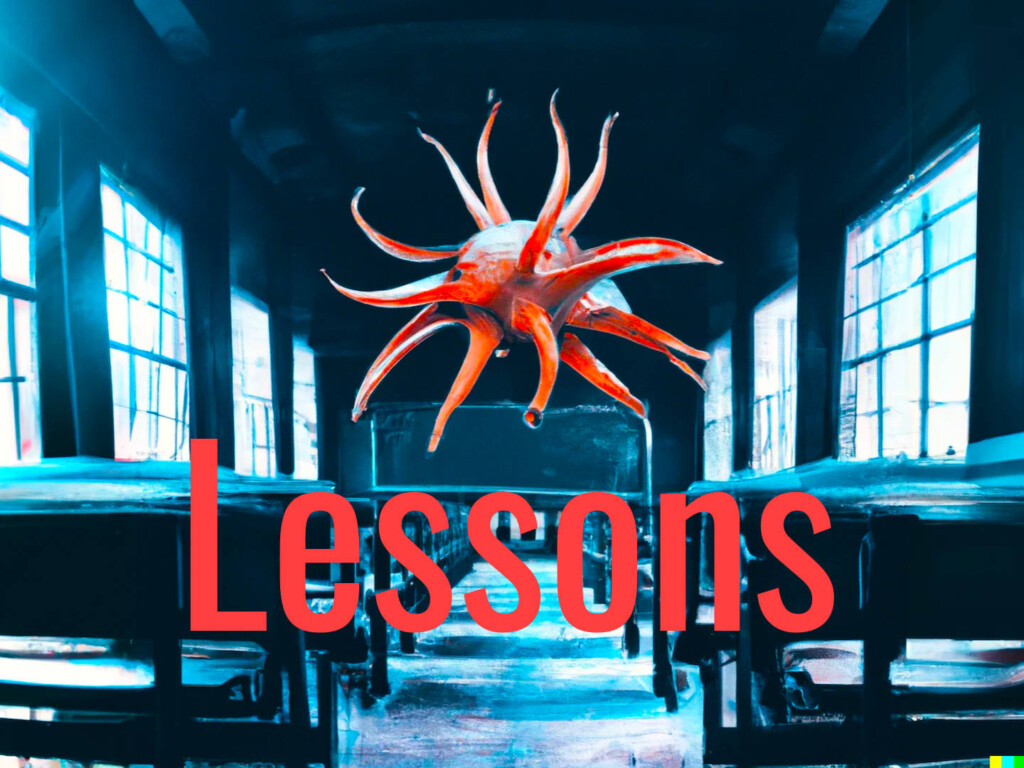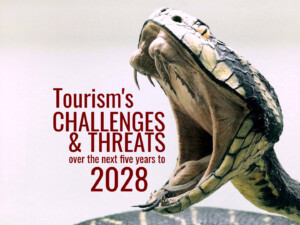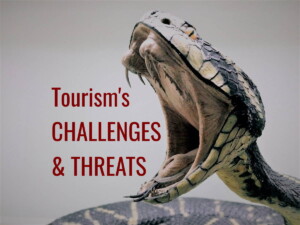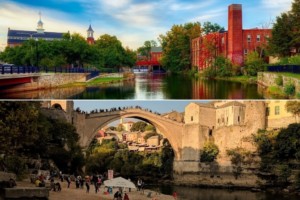What did tourism learn from the COVID-19 pandemic?

What was the main lesson of the COVID-19 pandemic, and has the travel & tourism industry learned it?
It’s a “Good Tourism” Insight Bites question.
Your correspondent put the question to the travel & tourism stakeholders in the “GT” network, inviting emailed written responses of no more than 300 words.
Bites menu
- Chinese travellers’ ‘fundamental lessons’ from COVID-19
- Be prepared
- Co-operation, preparedness, adaptability, diversification
- Modernity saved us
- The industry is not ready to learn lessons, unless …
- If and how the industry learned anything is ‘far from clear’
- Governments care little about small businesses
- ‘Lay the foundations for sustainability and resilience’
- Equip tourism students with transferable skills
- Travellers became more climate-conscious
- “GT” Insight BiteX (‘X’ is up to you)
- What do you think?
- Featured image (top of post)
- Previous “GT” Insight Bites
Chinese travellers’ ‘fundamental lessons’ from COVID-19
Wolfgang Georg Arlt, CEO, COTRI (China Outbound Tourism Research Institute); Director, Meaningful Tourism Center, Germany
After four decades of undiluted optimism, anxiety has arrived in China, the number one global tourism source market.
The global travel & tourism industry has an opportunity to provide the appropriate products.
The richest 7% who own more than 90% of all private wealth in China have learned several fundamental lessons from COVID-19 that now influence their travel aspirations and behaviour.
- Emigration. One can be a millionaire and play golf every weekend with the governor and still become the victim of lockdowns, with one’s apartment door welded shut, facing the risk of starvation. There are no limits to what the Chinese government can do. As a consequence, many Chinese high-net-worth individuals will still travel, but will not start in Mainland China as they have already emigrated or will do so in the coming months.
- Discovery. Bragging rights are no longer earned by staying in the most expensive suite at a tourism hotspot and ordering the most expensive wine on the menu. ‘Discovering’ new destinations, and getting value for money based on services customised to you are the new signs of sophistication, distinguishing the Chinese ‘global traveller’ from the nouveau riche tourist.
- Family is valuable in times of crisis when you need others you can completely rely on. This has resulted in more family travels abroad.
- Meaning. COVID-19 reminded the Chinese how fragile and valuable life is. Outdoor activities, nature, and closer contact with the visited cultures and people are more satisfying than endless shopping. ‘Meaningful Tourism’, which includes trips to support or restore physical and/or mental health will become more important.
Be prepared
Steve Noakes, Chair, Binna Burra Lodge; Founder, Pacific Asia Tourism; Chair, Ecolodges Indonesia
Be prepared for unexpected situations. Work with facts, not fiction.
Infectious diseases are an occupational risk. Tourism and hospitality workplaces are sites of easy transmission.
Improved awareness and practices of hygiene are a good outcome of the pandemic.
On their way to and from work, and while at work, protect your staff through masking, screening, distancing, and other measures that help to stop or reduce the chance of transmission.
If a staff member has symptoms, support them to get tested. Have back-up casual staff on stand-by.
If all your kitchen staff are exposed a few hours before a full-house is ready for dinner, and they have to be sent home, how will you handle that situation?
You’ll need reserve/emergency funds to get through tough cash flow periods of customer cancellations and disruptions to supply lines.
Ensure that more than one person can do critical tasks, especially information technology and communications.
And remember … More than 2,000 years ago, Confucious said:
“Our greatest glory is not in never falling, but in rising every time we fall.”
Co-operation, preparedness, adaptability, diversification
Rwaka Mabrise, Communications Officer, Red Rocks Initiative for Sustainable Development & Red Rocks Rwanda
The main lesson learned from the COVID-19 pandemic was the importance of global co-operation, preparedness, and resilience in the face of health crises.

The pandemic highlighted the interconnectedness of the world and the need for swift and coordinated responses to contain and mitigate the impact of such outbreaks.
In Rwanda, specific lessons the travel & tourism industry learned was the importance of flexibility, adaptability, and the integration of health and safety measures.
Our tourism industry has had to adapt quickly to changing circumstances, including implementing new health and safety protocols, adjusting travel policies, and finding innovative ways to engage with travellers.
Local travel & tourism entities have learned the critical importance of prioritising health and safety measures to build traveller confidence, including rigorous cleaning, social distancing, and communicating safety measures to travellers
Also, the pandemic accelerated the adoption of technology in various aspects, such as contactless check-ins, digital health passports, and online booking systems. These innovations aim to enhance safety and improve the overall travel experience.
Our local tour operators have recognised the need to diversify offerings to reduce dependency on specific markets or types of tourism. This diversification will help our tourism industry better withstand future shocks.
[Red Rocks is a valued “Good Tourism” Partner]
Modernity saved us
Jim Butcher, Reader, Canterbury Christ Church University, UK; Tourism’s Horizon; Politics of Tourism
The main lesson of the pandemic was that richer countries can cope with what nature has to throw at us. Modern medicine meant that the vaccine was developed in double quick time. Tragic as it was for all those affected, the pandemic’s effect was, as a result, far less than pandemics throughout history.
It is not the travel & tourism industry’s role to learn such lessons; they are there to sell holidays. But, unfashionable as it is to say it, I think that the industry has recommenced operations and growth in a commendable way.
That is testament to the millions of employees — some furloughed and others impoverished during the pandemic — who work in it. Let’s show solidarity with their struggles for greater remuneration, improved working conditions, and rights.
Consequently, I do not hold with the pessimistic view that sees the pandemic as something akin to Gaia’s revenge on hubristic consumerism.
The same lesson — that modern science and growth can be organised in the interests of people — can address the industry’s contribution to pollution and carbon emissions.
Some people welcomed the pause in travel as a precursor of less leisure travel for the long term to ‘save the planet’.
This is short sighted. We live on the cusp of an energy revolution that will see us asking rather different questions in a few decades.
The technology is there — electric power, hydrogen fuel cells, nuclear, and renewables — and it is advancing. The industry is learning lessons and adapting.
But we need growth to see that through. Growth and profits provide the resources to invest in the new technology and infrastructure that will bring fundamental changes.
We need the Promethean spirit to seize the opportunities within our grasp.
And we want to travel and enjoy holidays because we are human.
[Tourism’s Horizon is a valued “Good Tourism” Partner]
The industry is not ready to learn lessons, unless …
K Michael Haywood, Professor Emeritus, University of Guelph, Canada
Everyone involved in travel & tourism is dealing with the consequences of what we now know as long COVID; the persistent second and third order effects that no one expected or was prepared for:
- High levels of debt
- High interest rates
- A supply crisis
- Political polarisation
- An urban doom loop
When I wrote ‘A post-COVID-19 future – tourism re-imagined and re-enabled’ in 2020, I said that the survival of visitor-serving enterprises depended on them becoming ‘anti-fragile’; prepared to gain from a degree of disorder.
Based on what I’ve observed, few in the industry have been paying attention.
Why?
Their existing management practices are sticky, stubborn, and suitable only for stability. Practices that have dulled the senses, driven out intuition, created bureaucracies, impersonalised planning, abolished grassroots-learning and thick-knowing, and driven out commitment, human energy, and motivation.
Proposals to adapt to complexity, become more resilient, seek re-invention, or change business models, may be well-intentioned, yet possibly unrealistic, unless more organisations recognise that control, as a core maxim of management, is a myth when volatility, stressors, and randomness represent the norm.
Many authors have opined about the future of management, but few have actually taken the time to reflect on the nuances associated with anti-fragility. Here’s a simple overview and a more complex explanation.
Organisations cannot create buffers from environmental forces, but they can engage in concerted intervention to modernise their managerial practices, ensuring they become more organic, more human, and more meaningfully responsible to all the people and communities they serve.
If organisations are to become more aware of their options and exit ramps, and more connected and concerned about the sustained recovery and well-being of their communities-as-destinations, maybe they would learn a lesson or two; a lesson also revealed in the book The Wisdom of Plagues.
If and how the industry learned anything is ‘far from clear’
Ed Jackiewicz, Professor, California State University, Northridge, USA
If there was an upside to the COVID-19 pandemic it was that it gave us all time to pause and think about what we value most, how to live our best lives, and with whom we want to spend our time. Intimately wrapped up in this, of course, is travel & tourism.
For many, one of life’s most precious things is travel, and time away from the routine of jobs and daily activities.
In some places, with pretty much everyone isolated at home for nearly two years, one of the few activities people were allowed to do was to be outside by themselves.
In the US this gave a boost to nature travel, national parks, and other outdoor, mostly solitary activities.
The optimist in me believes that this has elevated the average person’s interest in and respect and appreciation for our environment and nature-based tourism. If and how the travel & tourism industry learned from these lessons is far from clear at this time.
Tourism for many is no longer divided from other activities; something people do two weeks per year or only on weekends. As I have discussed in a previous “GT” Insight Bites, there are opportunities to develop sustainable niches as more people integrate tourism and recreational activities into their everyday lives.
For some people this has required relocating to places that afford their desired lifestyle. Bend, Oregon is one place sought after by these ‘residential tourists’ or ‘lifestyle migrants’. A quick glance at the Visit Bend website clearly shows their emphasis on the experiences one can have when visiting here. It is a place to linger and savour.
Governments care little about small businesses
Richard Butler, Emeritus Professor of Tourism, University of Strathclyde, Scotland
I don’t think there is much that the travel & tourism industry can learn from COVID-19, except how vulnerable to a pandemic the world at large is, and how little the industry can do about it.
People travelling during a pandemic is a disaster so travel & tourism is bound to be hit hardest by restrictions on movement.
I hate to say it, but I doubt if anything has been learned except for an increased awareness of how little governments help, or appear concerned about, small independent businesses.
‘Lay the foundations for sustainability and resilience’
S Fatemeh Mostafavi Shirazi, Visiting scholar, Iran
COVID-19 was an unexpected shock to the world.
Tourism ground to almost a standstill, and its prospects confused experts and governments alike. A wide variety of plans were proposed to get the industry going again.
The pandemic had multidimensional effects; social, psychological, political, and more. It was painful in many ways.
And, what was the outcome? Which lessons did the tourism business learn?
It is worth noting that the adoption and application of lessons from those critical days are vital for future crises. It seems every country learned its own lessons given its own set of circumstances. But sometimes lessons learned are soon forgotten.
Post-COVID, sustainable tourism planning was/is a priority topic among many scholars. A few perspectives and studies on the subject that are of note include:
A growing number of studies underline the shift in consumption patterns and travel behavior, e.g. Baba et al.
Some indicate that nothing much has changed on that front. Aldao et al, for example, assert that “crowded highlights will continue to be visited, leaving fear and anxiety [behind and a growing] reluctance to pay for additional safety measures”.
Some studies have stressed the importance of crisis management, eg. Lew et al.
After reviewing many studies, the lesson I have learned is the need to lay the foundations for sustainability and resilience.
How to do this can be summarised in 13 key Cs: Creativity, Consistency, Capabilities, Collaboration, Communicating with communities, Consolidation, Cost management, Convergence, Configuration, Connectedness, Compatibility, Competition, and Culture.
I would like to end by quoting Michael Hall:
“[T]ourism is a means to an end. What really matters is planet, people, and our families.”
Equip tourism students with transferable skills
Shamiso Nyajeka, Head of Department, Kirirom Institute of Technology, Cambodia
The COVID-19 pandemic shook every sector, none more so than travel & tourism. Brakes were slammed on travel. Global restrictions brought the industry to a halt.
Beyond the plummeting visitor numbers and economic fallout, the pandemic has also reshaped tourism education. There is a need to equip students with transferable skills to navigate a fragile, evolving industry.
Drawing from my experiences as a tourism scholar across Africa, Europe, and Southeast Asia during and post-pandemic, I’ve witnessed a common thread: the fragility of the tourism industry.
As the virus spread, the industry’s vulnerability became crystal clear. It is not immune to external shocks, and educators must prepare students for uncertainty.
Pandemic-induced tourism job losses made careers in the field seem risky and unappealing. Fearful of sudden unemployment, prospective students became hesitant to pursue careers in tourism.
This wake-up call has prompted the education sector to revamp curricula. By integrating technology and sustainability, students gain versatile skills, ensuring adaptability in the face of disruptions. Such an approach not only equips students with transferable skills but also revives confidence in the industry.
Furthermore, the low uptake of tourism programs post-pandemic signals a need for innovative approaches to attracting students. Highlighting the industry’s dynamism and potential for innovation could rekindle interest in tourism education.
While the tourism industry has made strides in learning from the lessons of COVID-19, full integration and adaptation are ongoing processes. Recognising the need for resilience, flexibility, and sustainability is crucial for a comprehensive transformation.
Continued collaboration between academia and industry stakeholders, adaptation to emerging trends, and a commitment to preparing students for the dynamic nature of the field are vital for ensuring that the lessons of the pandemic are fully absorbed and integrated into the fabric of tourism education and practice.
Travellers became more climate-conscious
Herb Hiller, Writer & Publisher, The Climate Traveler, USA
By April 2020 COVID-19 was already rampant. People were panicked. America soon launched Operation Warp Speed to produce a vaccine. We appeared unified. America’s malign politics hadn’t yet begun its vilification of the National Institute of Health.
That same month I led a presentation for a Southeastern Trail and Greenways Conference of the East Coast Greenway Alliance in Jacksonville, Florida. The event was virtual.
Our presentation did not focus on the “revenge travel” that would preoccupy tourism practitioners when America reopened for business. Instead, it was about travel and climate action, the next global challenge already apparent.
Studies and stories from around the world since the 1990s and right up to and during COVID-19, such as by the International Monetary Fund and The Guardian, had connected the ill effects of climate change to the “weather-sensitive” tourism sector; particularly in small island developing states.
Yet when COVID-19 restrictions gave way to what The New York Times in mid-2023 called “two years of red-hot ‘revenge spending’”, the World Travel & Tourism Council and the US Travel Association flogged the industry to intensify marketing.
They ignored how travellers had become more ready and willing to take climate into account when planning their trips; failed to address this shift in consumer outlook.
The result? Intense greenwashing and large failure to even refer to “climate” in destination marketing.
Yet tourism is a free market matter. If greenwashing by the legacy industry continues to slow effective action, newcomers will fill the gap.
For example, cruise-ferries will win over customers from cruise-only fleets, and new lodgings systems such as 1 Hotels, Green Pearls, and Hersha Hospitality will challenge the likes of Hilton and Marriott.
Leisure and business travel will drive growth to where travellers are listened to.
“GT” Insight BiteX (‘X’ is up to you)
The “Good Tourism” Blog offers a great opportunity to any travel & tourism stakeholder who wishes to express themself in writing for the benefit of “GT’s” thoughtful and open-minded readers. To feature in the next “GT” Insight Bite compilation, send no more than 300 words (300 words or fewer (</=300 words)) on any tourism-related idea or concern you may have. “GT’s” publisher will personally help with basic copy editing, so don’t by shy if you lack confidence in writing English.
Send your “GT” Insight Bite and picture to [email protected]
What do you think?
In a comment below share your own thoughts about lessons that the travel & tourism industry should have learned from the COVID-19 pandemic. SIGN IN or REGISTER first. (After signing in you will need to refresh this page to see the comments section.)
Or write a “GT” Insight or “GT” Insight Bite of your own. The “Good Tourism” Blog welcomes diversity of opinion and perspective about travel & tourism, because travel & tourism is everyone’s business.
This is an open invitation to travel & tourism stakeholders from any background to share their thoughts in plain English with a global industry audience.
“GT” doesn’t judge. “GT” publishes. “GT” is where free thought travels.
If you think the tourism media landscape is better with “GT” in it, then please …
Featured image (top of post)
What was the main lesson of the COVID-19 pandemic, and has the travel & tourism industry learned it? Base image generated by DALL‑E, which was prompted for a surrealist image of a viral particle in front of a classroom. Curiously, a request specifying a coronavirus particle was rejected. “GT” added ‘Lessons’.
Previous “GT” Insight Bites
- In 2024, what are the best opportunities for tourism over the next five years?
- Tourism’s biggest challenges & threats over the next five years to 2028
- On empowerment, promotion, and the power of expression
- On enrichment, repatriation, the double-edged blade, and war
- On tourism technology, progress, and local benefit-sharing
- Hey, travel & tourism, are you ‘neocolonialist’?
- Who’s the new boss? Asia Pacific tourism industry association seeks leader
- ‘The hospitality industry offers a great career.’ Really?
- Cruise ships: Blessing or blight?
- Tourist vs traveller: What’s the difference?
- The heads of finance, operations, and PR walk into their boss’s office …
- Yes, Tourism Minister
- What are tourism’s biggest challenges & threats over the next five years?
- ‘Tourism is built on the backbone of white supremacy’. What do you think?
- Really, what’s the difference? ‘Sustainable tourism’ vs ‘regenerative tourism’
- Want a career in tourism? Important things you should know
- Diverse perspectives on travel & tourism and a fairer world
- Diverse perspectives on economic degrowth and tourism
- Diverse perspectives on visitor dispersion














